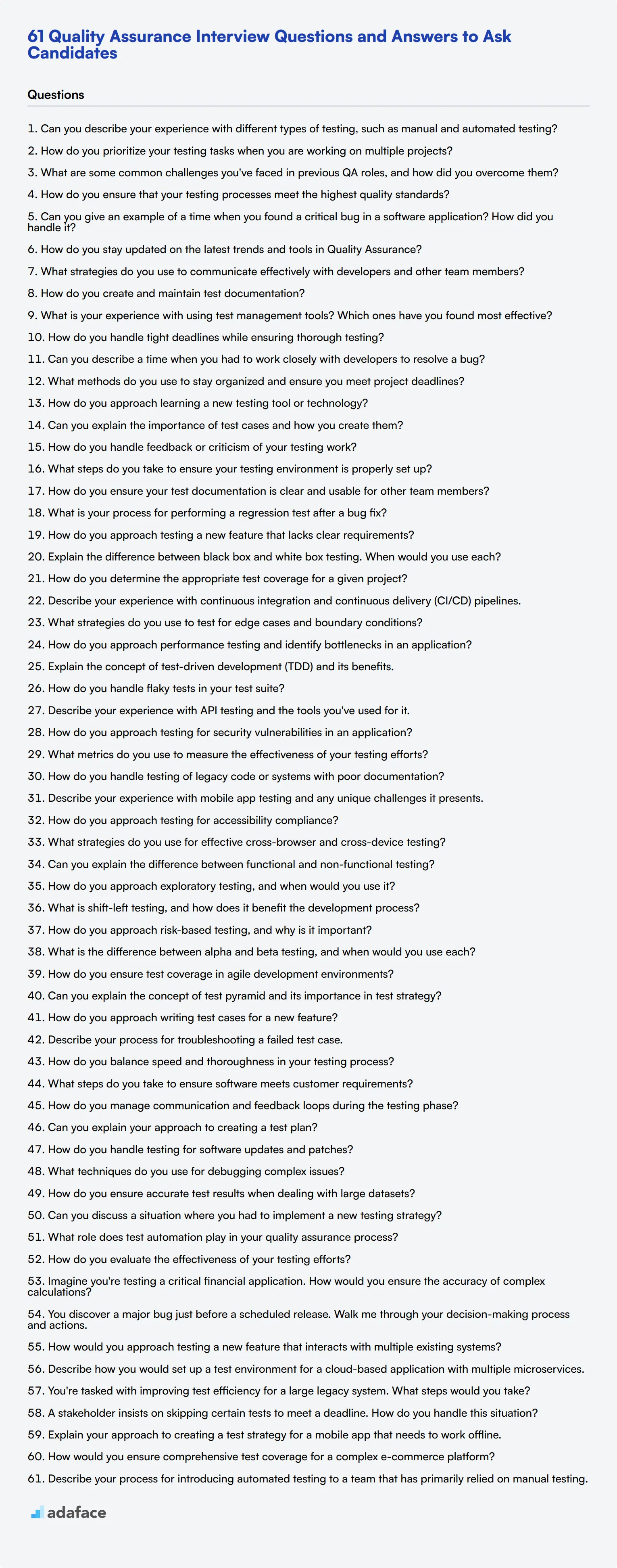Hiring the right Quality Assurance (QA) specialists is crucial for maintaining high software standards and user satisfaction. Asking the right interview questions helps you identify candidates with the technical skills, problem-solving abilities, and attention to detail needed for QA roles.
This blog post provides a comprehensive list of QA interview questions tailored for different experience levels and areas of expertise. From common questions for beginners to advanced queries for seasoned professionals, we cover a wide range of topics including testing methodologies, software quality assurance, and situational scenarios.
By using these questions, you can effectively evaluate candidates' knowledge and skills in quality assurance. Consider complementing your interview process with a QA engineer test to get a more holistic view of candidates' capabilities before the interview stage.
Table of contents
10 common Quality Assurance interview questions to ask your candidates
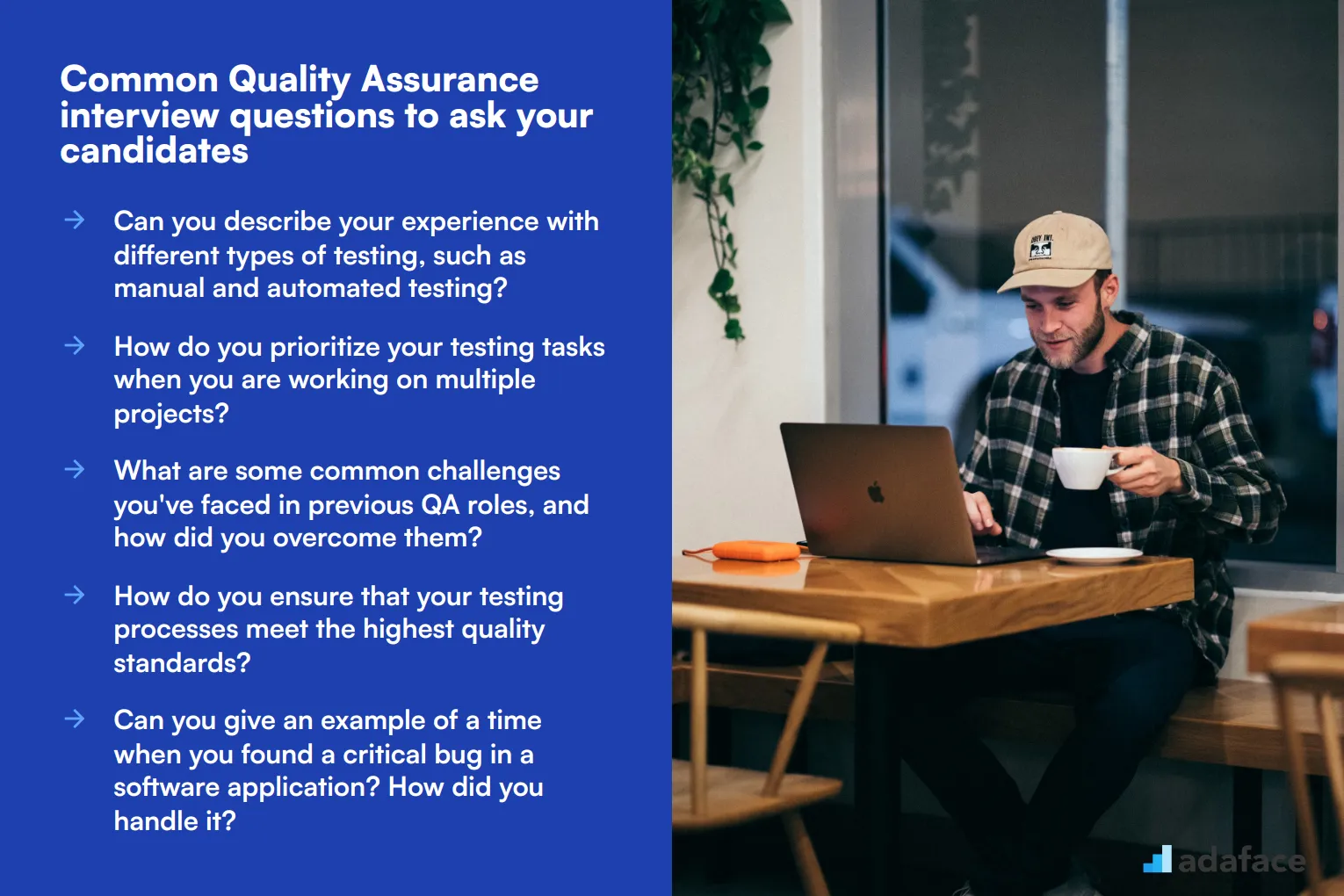
To find the right Quality Assurance candidate for your team, it's important to ask the right questions during the interview. This list of 10 common Quality Assurance interview questions will help you gauge the candidate's expertise, problem-solving skills, and cultural fit. For more insights on what to look for in a QA role, check out our QA Lead job description.
- Can you describe your experience with different types of testing, such as manual and automated testing?
- How do you prioritize your testing tasks when you are working on multiple projects?
- What are some common challenges you've faced in previous QA roles, and how did you overcome them?
- How do you ensure that your testing processes meet the highest quality standards?
- Can you give an example of a time when you found a critical bug in a software application? How did you handle it?
- How do you stay updated on the latest trends and tools in Quality Assurance?
- What strategies do you use to communicate effectively with developers and other team members?
- How do you create and maintain test documentation?
- What is your experience with using test management tools? Which ones have you found most effective?
- How do you handle tight deadlines while ensuring thorough testing?
8 Quality Assurance interview questions and answers to evaluate junior quality assurance specialists
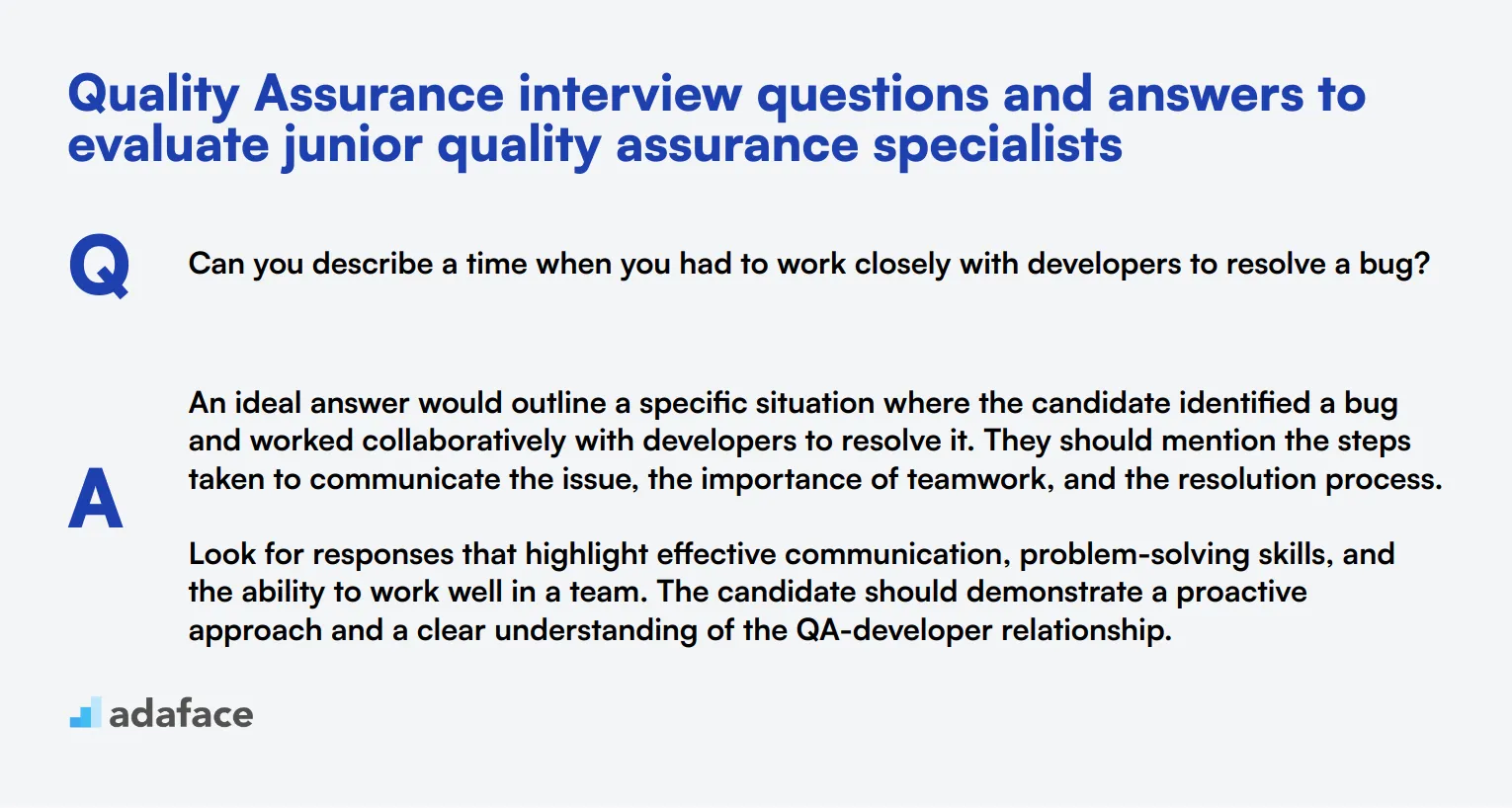
To effectively assess junior quality assurance specialists, these interview questions are designed to gauge their fundamental understanding and practical skills. Use this list when you want to ensure candidates are well-prepared to handle the responsibilities of the role and fit seamlessly into your team's workflow.
1. Can you describe a time when you had to work closely with developers to resolve a bug?
An ideal answer would outline a specific situation where the candidate identified a bug and worked collaboratively with developers to resolve it. They should mention the steps taken to communicate the issue, the importance of teamwork, and the resolution process.
Look for responses that highlight effective communication, problem-solving skills, and the ability to work well in a team. The candidate should demonstrate a proactive approach and a clear understanding of the QA-developer relationship.
2. What methods do you use to stay organized and ensure you meet project deadlines?
Candidates should describe their organizational strategies, such as using task management tools, maintaining detailed documentation, and setting clear priorities. They might also mention time management techniques and how they handle unexpected issues.
A strong answer will show that the candidate is disciplined, reliable, and capable of managing multiple tasks efficiently. Look for specific examples that demonstrate their ability to stay organized under pressure.
3. How do you approach learning a new testing tool or technology?
The candidate should explain their learning process, which might include researching the tool, taking online courses, reading documentation, and practicing with the tool in a test environment. They should also mention how they stay updated on new trends and technologies.
Look for candidates who show a proactive and continuous learning attitude. Their answer should reflect a willingness to adapt and grow with new tools and technologies, which is crucial in the ever-evolving QA field.
4. Can you explain the importance of test cases and how you create them?
Test cases are essential for ensuring that all functionalities of the software are tested systematically. The candidate should describe their process for creating test cases, which includes understanding requirements, defining test steps, and setting expected outcomes.
Ideal responses should emphasize attention to detail and thoroughness in test case creation. Candidates should demonstrate their ability to think from an end-user perspective and anticipate potential issues.
5. How do you handle feedback or criticism of your testing work?
A good answer will show that the candidate views feedback as an opportunity for improvement. They should mention how they take feedback constructively, analyze it, and implement changes to enhance their testing processes.
Look for signs of emotional intelligence and the ability to handle criticism positively. The candidate should demonstrate resilience and a commitment to continuous improvement.
6. What steps do you take to ensure your testing environment is properly set up?
Setting up a testing environment involves installing the necessary tools, configuring the system, and ensuring it mirrors the production environment as closely as possible. The candidate should also mention checking for software dependencies and network configurations.
Ideal candidates will show meticulous attention to detail and a comprehensive understanding of the importance of a well-configured testing environment. They should demonstrate an organized and methodical approach.
7. How do you ensure your test documentation is clear and usable for other team members?
Clear test documentation involves writing in a concise and straightforward manner, using consistent terminology, and including all necessary details like test steps, expected results, and actual outcomes. The candidate should also mention the use of visual aids like screenshots when necessary.
The best answers will reflect the candidate's ability to communicate complex information clearly and effectively. Look for examples that show their documentation has been useful to others in the past.
8. What is your process for performing a regression test after a bug fix?
Regression testing involves re-running previous test cases to ensure that recent changes haven’t introduced new issues. Candidates should describe their process, which might include selecting relevant test cases, prioritizing critical areas, and using automated tools if available.
A strong candidate will highlight their systematic approach to regression testing and their understanding of its importance in maintaining software quality. Look for thoroughness and attention to detail in their response.
15 intermediate Quality Assurance interview questions and answers to ask mid-tier quality assurance specialists.
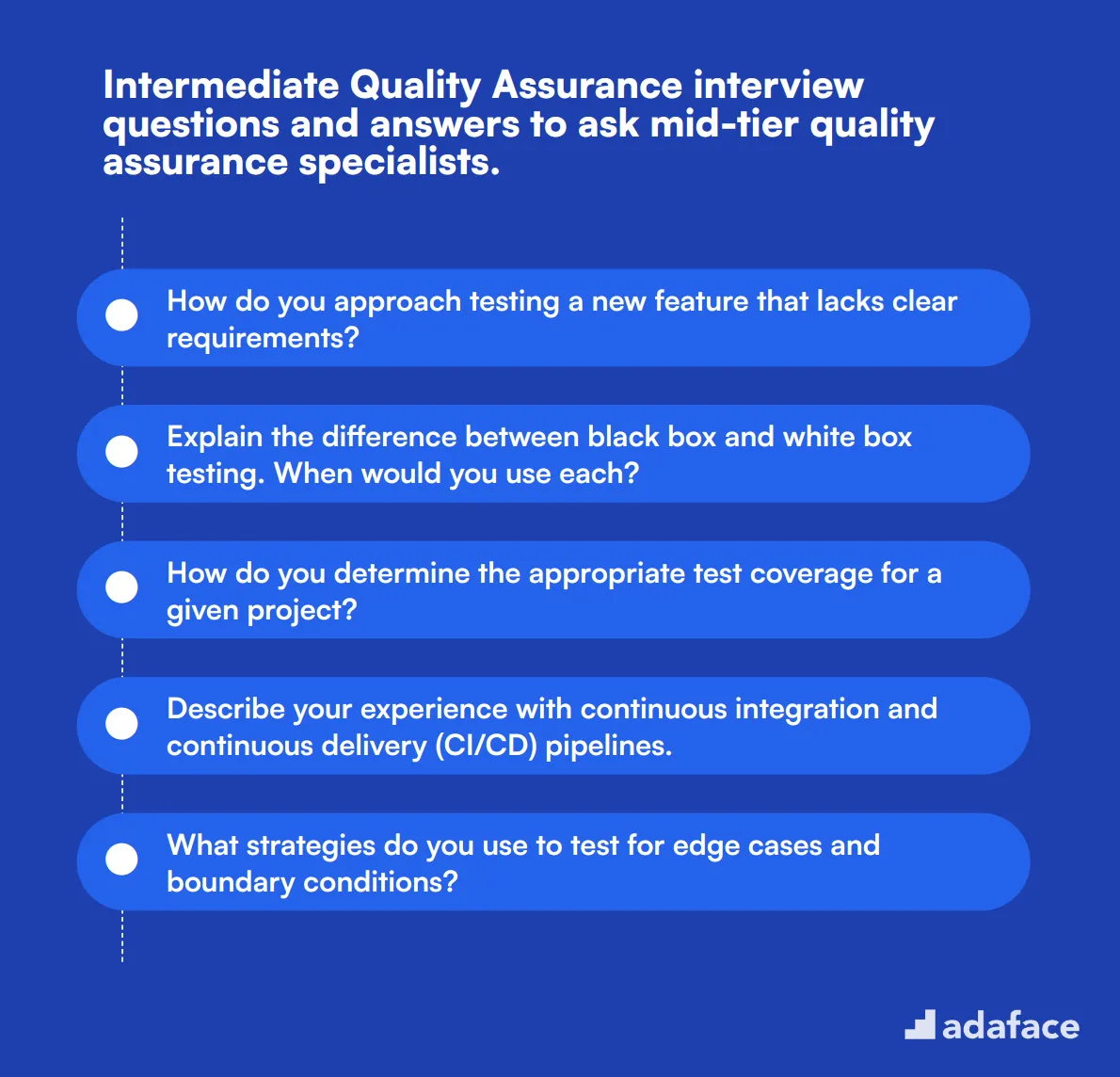
To assess the capabilities of mid-tier quality assurance specialists, use these 15 intermediate interview questions. These questions will help you evaluate candidates' technical knowledge, problem-solving skills, and ability to handle complex testing scenarios.
- How do you approach testing a new feature that lacks clear requirements?
- Explain the difference between black box and white box testing. When would you use each?
- How do you determine the appropriate test coverage for a given project?
- Describe your experience with continuous integration and continuous delivery (CI/CD) pipelines.
- What strategies do you use to test for edge cases and boundary conditions?
- How do you approach performance testing and identify bottlenecks in an application?
- Explain the concept of test-driven development (TDD) and its benefits.
- How do you handle flaky tests in your test suite?
- Describe your experience with API testing and the tools you've used for it.
- How do you approach testing for security vulnerabilities in an application?
- What metrics do you use to measure the effectiveness of your testing efforts?
- How do you handle testing of legacy code or systems with poor documentation?
- Describe your experience with mobile app testing and any unique challenges it presents.
- How do you approach testing for accessibility compliance?
- What strategies do you use for effective cross-browser and cross-device testing?
7 Quality Assurance interview questions and answers related to testing methodologies
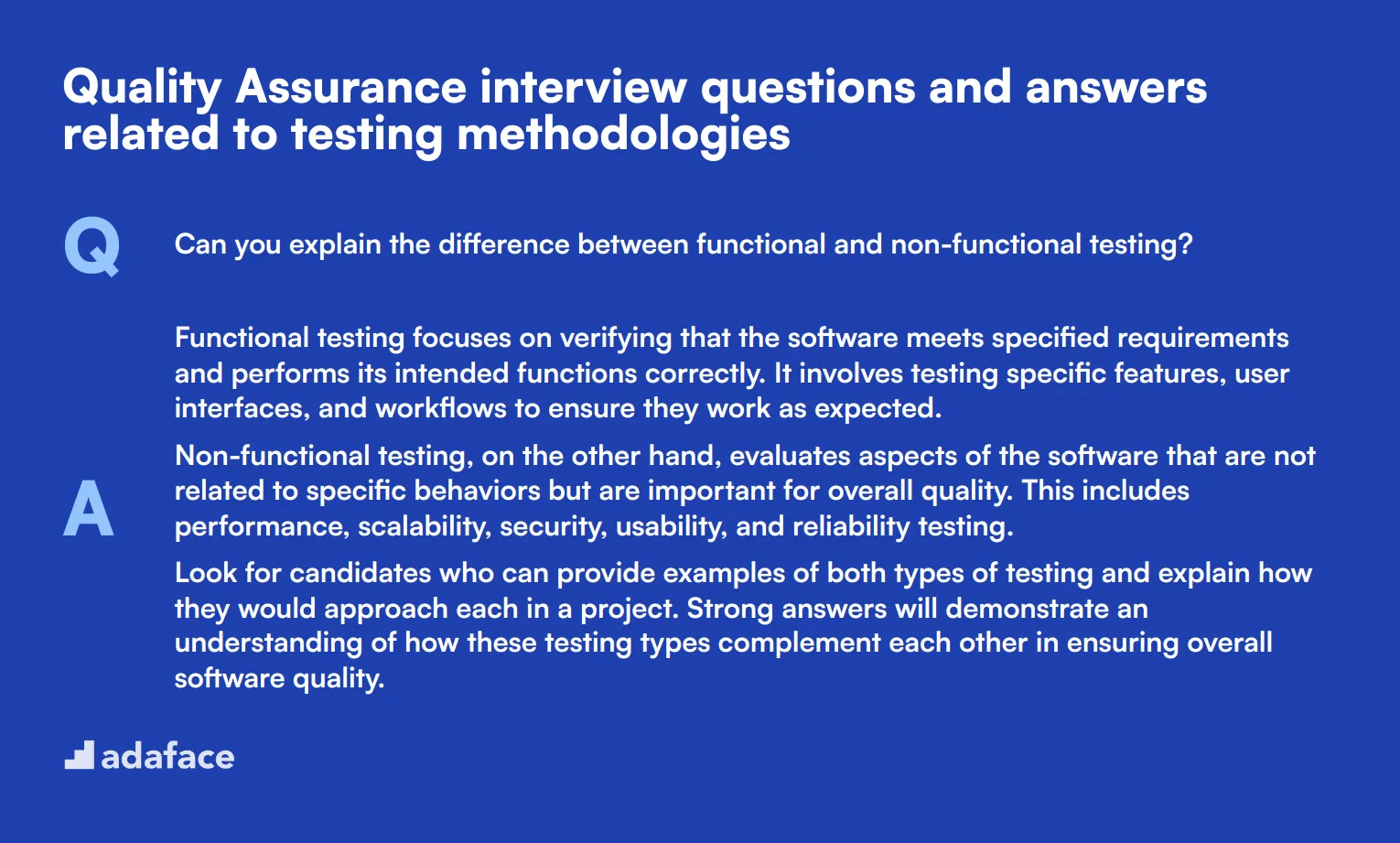
When interviewing for Quality Assurance positions, it's crucial to assess candidates' understanding of various testing methodologies. These questions will help you gauge a candidate's knowledge and experience with different testing approaches. Use them to spark discussions about real-world scenarios and evaluate problem-solving skills.
1. Can you explain the difference between functional and non-functional testing?
Functional testing focuses on verifying that the software meets specified requirements and performs its intended functions correctly. It involves testing specific features, user interfaces, and workflows to ensure they work as expected.
Non-functional testing, on the other hand, evaluates aspects of the software that are not related to specific behaviors but are important for overall quality. This includes performance, scalability, security, usability, and reliability testing.
Look for candidates who can provide examples of both types of testing and explain how they would approach each in a project. Strong answers will demonstrate an understanding of how these testing types complement each other in ensuring overall software quality.
2. How do you approach exploratory testing, and when would you use it?
Exploratory testing is a dynamic approach where testers simultaneously learn about the system, design tests, and execute them. It's particularly useful when dealing with new features, time constraints, or when formal test cases are lacking.
A good approach to exploratory testing involves:
- Setting clear objectives for the testing session
- Using heuristics and test charters to guide exploration
- Documenting findings and steps to reproduce issues
- Time-boxing sessions to maintain focus and efficiency
Candidates should emphasize the importance of balancing exploratory testing with more structured approaches. Look for those who can explain how they document and share findings from exploratory sessions to benefit the entire QA process.
3. What is shift-left testing, and how does it benefit the development process?
Shift-left testing is an approach that moves testing activities earlier in the software development lifecycle. Instead of waiting until after implementation, testing begins during the requirements and design phases.
Benefits of shift-left testing include:
- Earlier detection of defects, reducing cost and time to fix
- Improved collaboration between developers and testers
- Better alignment of testing with project goals and requirements
- Increased overall product quality
Look for candidates who can explain how they would implement shift-left testing in a project. Strong answers might include strategies for integrating testing into the design phase, involving QA in requirement reviews, or implementing continuous testing practices.
4. How do you approach risk-based testing, and why is it important?
Risk-based testing is a strategy that prioritizes testing efforts based on the potential impact and likelihood of failures. It helps teams focus on the most critical areas of the application, especially when time and resources are limited.
A typical approach to risk-based testing includes:
- Identifying potential risks in the system
- Assessing the impact and probability of each risk
- Prioritizing test cases based on risk levels
- Allocating more resources to high-risk areas
Candidates should demonstrate an understanding of how to identify and assess risks in a project context. Look for those who can explain how they would collaborate with stakeholders to determine risk factors and how they would adjust testing strategies based on risk assessments.
5. What is the difference between alpha and beta testing, and when would you use each?
Alpha testing is typically conducted internally by the development team or dedicated testers in a controlled environment. It aims to identify and fix major bugs before the software is released to external users. Beta testing, on the other hand, involves distributing the software to a limited group of external users to gather feedback and identify issues in real-world conditions.
Use cases for each:
- Alpha testing: When the product is feature-complete but not fully stable, to catch major issues before wider release
- Beta testing: When the product is relatively stable, to gather user feedback and identify edge cases or compatibility issues
Look for candidates who understand the different goals and methodologies of each testing phase. They should be able to explain how they would set up and manage both alpha and beta testing processes, including selecting participants and collecting feedback.
6. How do you ensure test coverage in agile development environments?
Ensuring test coverage in agile environments requires a strategic approach that adapts to rapid development cycles. Key strategies include:
- Implementing continuous integration and automated testing
- Using test-driven development (TDD) practices
- Maintaining a living test plan that evolves with each sprint
- Prioritizing tests based on user stories and acceptance criteria
- Regularly reviewing and updating test cases to reflect changing requirements
Look for candidates who can explain how they balance comprehensive testing with the need for speed in agile environments. Strong answers will include methods for tracking test coverage across sprints and strategies for addressing gaps in coverage.
7. Can you explain the concept of test pyramid and its importance in test strategy?
The test pyramid is a model that suggests how to balance different types of automated tests. It proposes a larger number of low-level unit tests at the base, fewer integration tests in the middle, and even fewer high-level end-to-end tests at the top.
The importance of the test pyramid lies in its ability to:
- Improve test execution speed by focusing on faster, lower-level tests
- Reduce overall testing costs
- Provide quicker feedback to developers
- Increase test reliability by reducing dependence on brittle UI tests
Look for candidates who can discuss how they would implement a test pyramid in practice. They should be able to explain the trade-offs between different types of tests and how they would determine the right balance for a given project.
12 Quality Assurance questions related to ensuring software quality
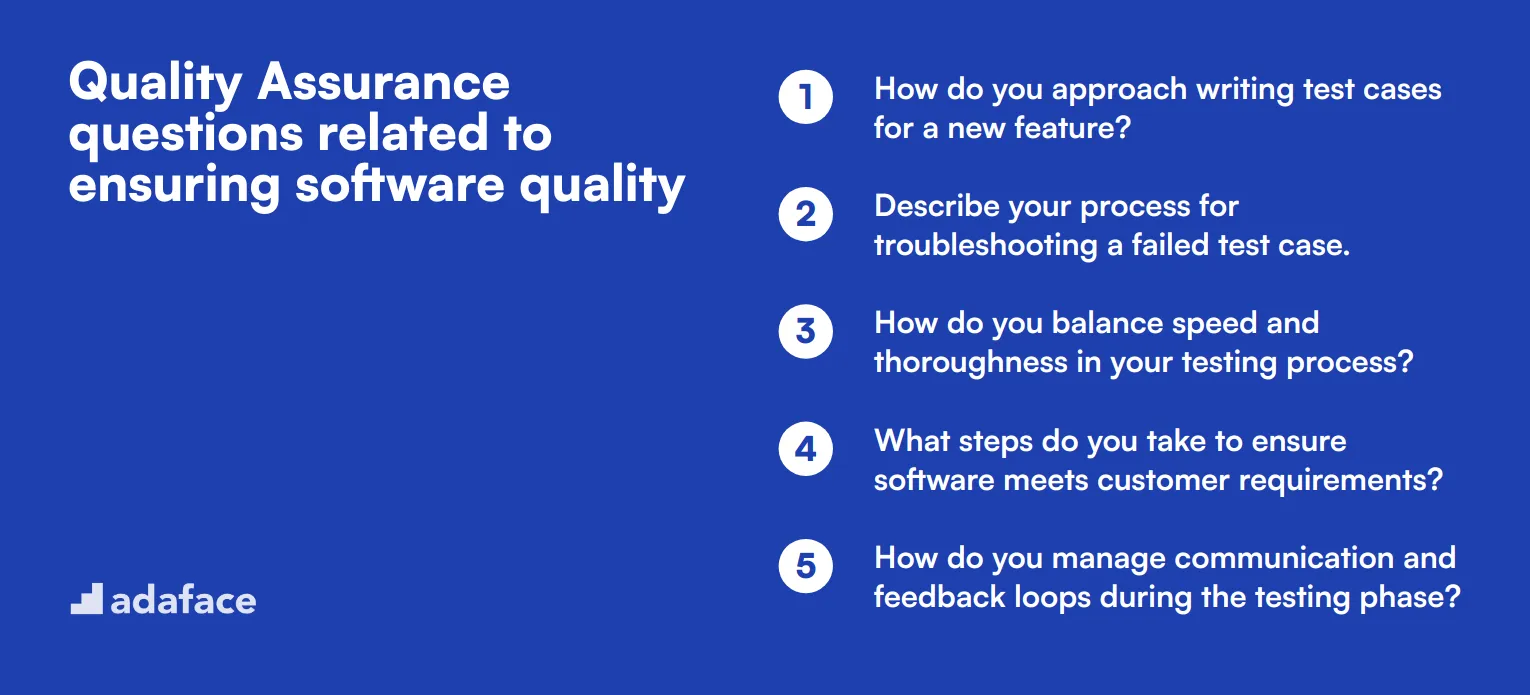
To ensure your candidates possess the necessary skills to maintain high software quality, consider asking them these practical Quality Assurance interview questions. These questions can help you assess their abilities and methodologies, ensuring they meet the specific requirements of your QA team.
- How do you approach writing test cases for a new feature?
- Describe your process for troubleshooting a failed test case.
- How do you balance speed and thoroughness in your testing process?
- What steps do you take to ensure software meets customer requirements?
- How do you manage communication and feedback loops during the testing phase?
- Can you explain your approach to creating a test plan?
- How do you handle testing for software updates and patches?
- What techniques do you use for debugging complex issues?
- How do you ensure accurate test results when dealing with large datasets?
- Can you discuss a situation where you had to implement a new testing strategy?
- What role does test automation play in your quality assurance process?
- How do you evaluate the effectiveness of your testing efforts?
9 situational Quality Assurance interview questions for hiring top quality assurance specialists
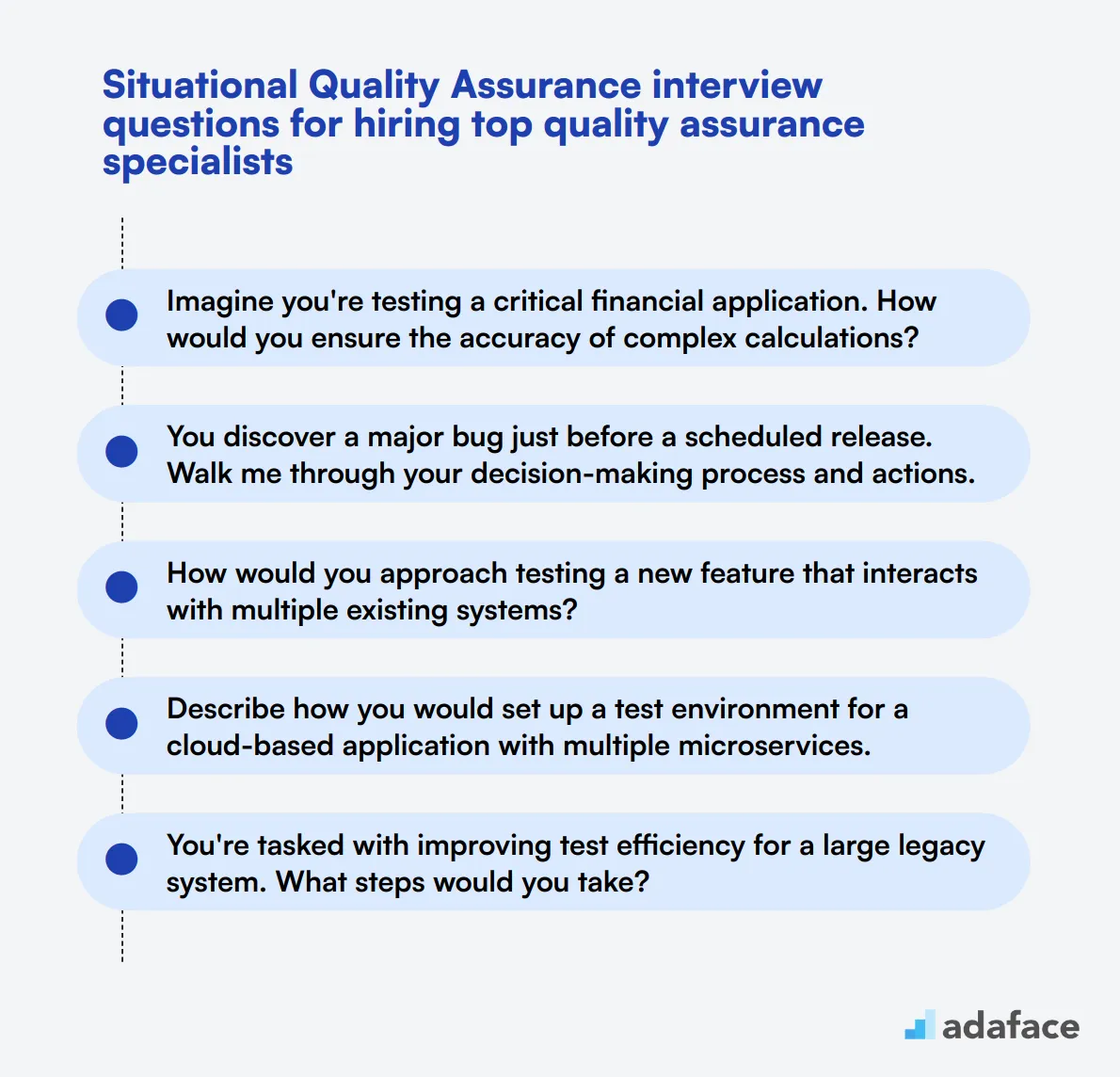
To assess a candidate's ability to handle real-world quality assurance scenarios, use these situational interview questions. They help evaluate problem-solving skills, decision-making abilities, and how candidates apply their knowledge in practical situations.
- Imagine you're testing a critical financial application. How would you ensure the accuracy of complex calculations?
- You discover a major bug just before a scheduled release. Walk me through your decision-making process and actions.
- How would you approach testing a new feature that interacts with multiple existing systems?
- Describe how you would set up a test environment for a cloud-based application with multiple microservices.
- You're tasked with improving test efficiency for a large legacy system. What steps would you take?
- A stakeholder insists on skipping certain tests to meet a deadline. How do you handle this situation?
- Explain your approach to creating a test strategy for a mobile app that needs to work offline.
- How would you ensure comprehensive test coverage for a complex e-commerce platform?
- Describe your process for introducing automated testing to a team that has primarily relied on manual testing.
Which Quality Assurance skills should you evaluate during the interview phase?
During the interview phase, it is important to recognize that you cannot assess every skill of a Quality Assurance candidate in a single conversation. However, there are core skills that are critical to the role and can significantly impact the success of your QA processes. Here are the key skills to evaluate during your interviews.
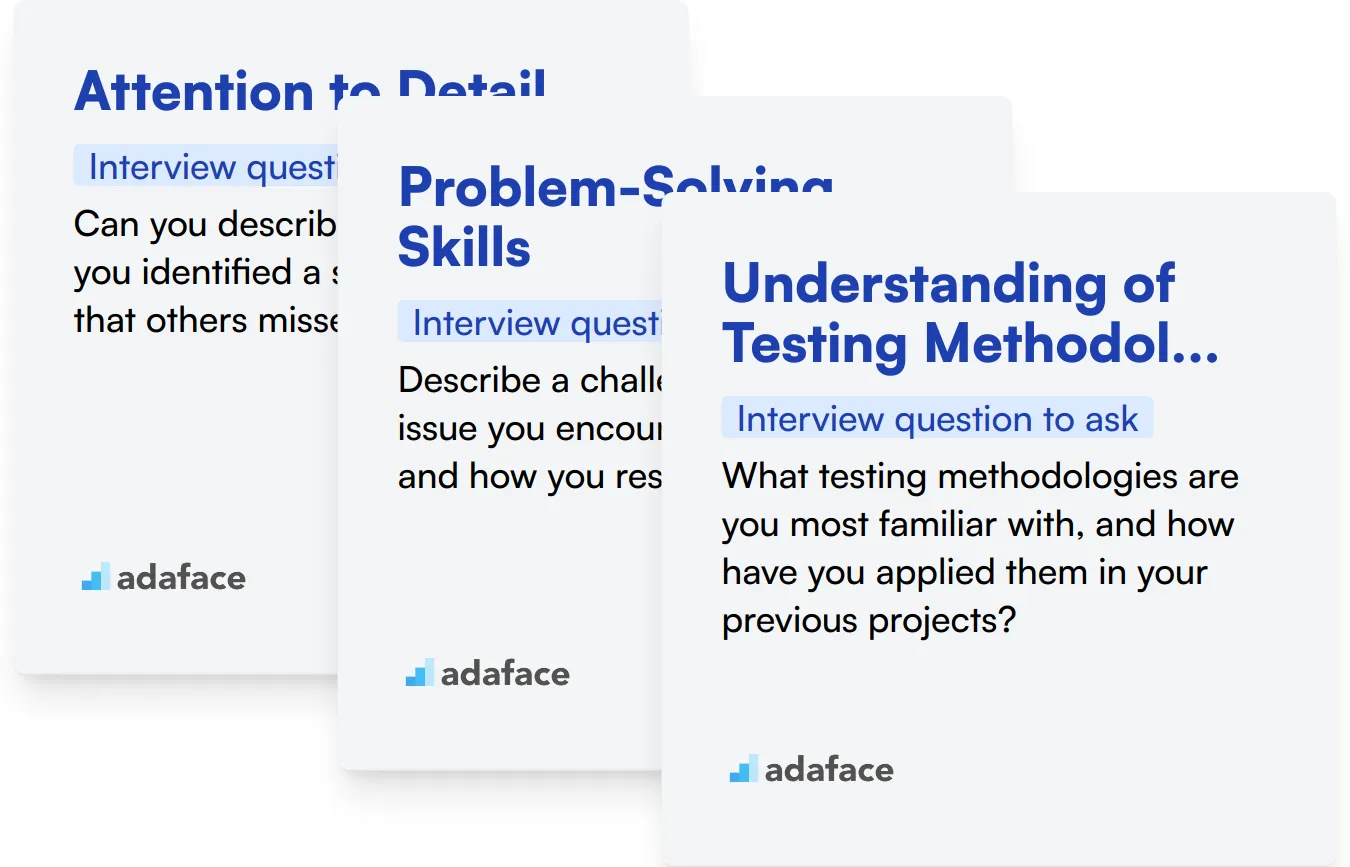
Attention to Detail
To filter for attention to detail, consider using an assessment test that includes relevant MCQs. This will provide a quantitative measure of a candidate's capability in this area, helping you to identify the right fit for your team. You might find an appropriate test here.
Additionally, you can ask targeted interview questions to further gauge this skill.
Can you describe a time when you identified a significant error that others missed?
Look for answers that reflect a systematic approach to detail-oriented tasks. Candidates should describe their process for reviewing work and how they manage to catch errors in their projects.
Problem-Solving Skills
To assess problem-solving skills, consider administering a test that includes relevant MCQs. This can help filter candidates who excel in troubleshooting scenarios. Check out the test here.
You can also pose specific questions to evaluate how candidates approach problem-solving.
Describe a challenging bug or issue you encountered in a project and how you resolved it.
Listen for structured thinking and a logical approach in their response. Candidates should illustrate their thought process and how they arrived at a solution, demonstrating resourcefulness.
Understanding of Testing Methodologies
You can test this understanding through relevant assessments that include MCQs. This can efficiently gauge candidates’ familiarity with testing methodologies. Consider using a test that covers this area, such as this.
In addition to tests, you can ask direct questions to assess their knowledge.
What testing methodologies are you most familiar with, and how have you applied them in your previous projects?
Look for depth in their knowledge and practical applications. Candidates should be able to discuss methodology specifics and give examples of their use in real-world scenarios.
Strategic Utilization of Quality Assurance Interview Questions
Before you begin putting what you've learned into practice, here are a few strategic tips to effectively use Quality Assurance interview questions to identify the best candidates.
1. Incorporate Skill Tests in the Pre-Interview Stage
Integrating skill tests prior to the interview can significantly streamline the hiring process by ensuring only qualified candidates reach the interview stage. This approach saves time and resources while enhancing the quality of your candidate pool.
For Quality Assurance roles, consider using tests such as the QA Engineer Test or the Manual Testing Online Test. These assessments help verify candidates' technical skills and their ability to handle real-world testing scenarios.
By employing these tests, you can gauge a candidate's practical skills and knowledge before the interview, ensuring a more focused and effective interview process. Now, let's look at how to optimize the interview questions themselves.
2. Carefully Select and Compile Interview Questions
Time is a constraint in interviews, making it imperative to choose questions that effectively assess key abilities within a limited timeframe. Focus on selecting questions that evaluate critical skills necessary for the role.
Explore our extensive list of interview questions for related skills such as automation testing, software testing, or even soft skills like communication to ensure a well-rounded evaluation. This careful selection helps in better understanding the candidate's capabilities in crucial areas.
3. Emphasize the Importance of Follow-Up Questions
Using only preset interview questions may not be enough to gauge the depth of a candidate's knowledge and skills. Follow-up questions are essential to explore answers further and clarify doubts, providing insights into the candidate's critical thinking and problem-solving abilities.
For example, if a candidate describes a testing process they implemented, you might follow up with, 'Can you explain a challenge you faced during this process and how you overcame it?' This question helps assess their ability to handle obstacles and adapt solutions.
Use Quality Assurance interview questions and skills tests to hire talented QA specialists
To ensure you're hiring a candidate with the right Quality Assurance skills, it's important to assess their capabilities accurately. One of the most effective ways to achieve this is by utilizing skill tests. Consider our QA Engineer Test or Manual Testing Online Test to evaluate their expertise.
Once you've implemented these tests, you can effectively shortlist the best applicants for interviews. To get started, you can sign up on our online assessment platform to access a range of tests and streamline your hiring process.
QA Engineer Test
Download Quality Assurance interview questions template in multiple formats
Quality Assurance Interview Questions FAQs
Common questions include queries about testing methodologies, software quality, and situational scenarios to evaluate a candidate's problem-solving skills.
Focus on basic QA concepts, entry-level software testing knowledge, and general problem-solving abilities.
You should ask about intermediate QA concepts, their experience with various testing tools, and how they handle more complex software quality challenges.
Situational questions help you understand how candidates approach real-world problems and their ability to adapt to different scenarios.
Questions can include topics like Agile, Scrum, Waterfall, and how candidates implement these methodologies in their testing processes.
Use a mix of technical, situational, and methodological questions to get a comprehensive view of a candidate's abilities and experience.

40 min skill tests.
No trick questions.
Accurate shortlisting.
We make it easy for you to find the best candidates in your pipeline with a 40 min skills test.
Try for freeRelated posts
Free resources




